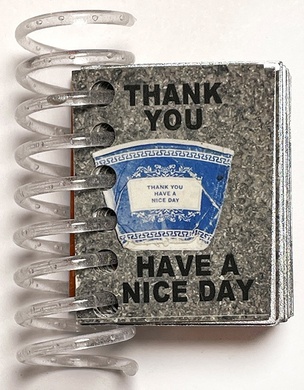Catalog
Printed Matter’s online catalog is one of the largest and most comprehensive databases of artists’ books and related publications. The catalog contains records for approximately 45,000 titles, which includes inventory currently in stock and available for sale, as well as an archive of titles previously stocked.


















![Protect Me From What I Want Wooden Postcard [Gold Text]](https://d23eqwv5slm408.cloudfront.net/api/file/1rE09CiPQpGMa3jDySHP/convert?fit=max&h=480&w=304&compress=true&fit=max)
![Words Tend To Be Inadequate Wooden Postcard [Gold Text]](https://d23eqwv5slm408.cloudfront.net/api/file/HhtS8vASTpWSUA41En0s/convert?fit=max&h=480&w=304&compress=true&fit=max)

![All Things are Delicately Interconnected Wooden Postcard [Gold Text]](https://d23eqwv5slm408.cloudfront.net/api/file/muHR6MdRL6EgJe6ATC1m/convert?fit=max&h=480&w=304&compress=true&fit=max)

![Protect Me From What I Want Wooden Postcard [Red Text]](https://d23eqwv5slm408.cloudfront.net/api/file/xKZZfpWNQRChHZkrFntw/convert?fit=max&h=480&w=304&compress=true&fit=max)
![All Things Are Delicately Interconnected Wooden Postcard [Red Text]](https://d23eqwv5slm408.cloudfront.net/api/file/C6N6ppL6SnKYeXJuCtbd/convert?fit=max&h=480&w=304&compress=true&fit=max)







![In a Dream You Saw a Way to Survive and You Were Full of Joy Wooden Postcard [Black Text]](https://d23eqwv5slm408.cloudfront.net/api/file/WEd4Y05lROcLsySIoRfJ/convert?fit=max&h=480&w=304&compress=true&fit=max)
![Raise Boys and Girls the Same Way Wooden Postcard [Red Text]](https://d23eqwv5slm408.cloudfront.net/api/file/uV8m1BsaQ6OCflSE578g/convert?fit=max&h=480&w=304&compress=true&fit=max)
![Money Creates Taste Wooden Postcard [Black Text]](https://d23eqwv5slm408.cloudfront.net/api/file/FDyWtNrERsKaawMR4dY8/convert?fit=max&h=480&w=304&compress=true&fit=max)
![The Breakdown Comes When You Stop Controlling Yourself and Want the Release of a Bloodbath Wooden Postcard [Black Text]](https://d23eqwv5slm408.cloudfront.net/api/file/Yq72qCUcTzenjZPmDHHH/convert?fit=max&h=480&w=304&compress=true&fit=max)

![Expiring for Love is Beautiful But Stupid Wooden Postcard [Red Text]](https://d23eqwv5slm408.cloudfront.net/api/file/PT3j9ljKSpS25IO8wycY/convert?fit=max&h=480&w=304&compress=true&fit=max)
![You Are Guileless In Your Dreams Wooden Postcard [Red Text]](https://d23eqwv5slm408.cloudfront.net/api/file/ZK3xDij0TaSAYgCc33sM/convert?fit=max&h=480&w=304&compress=true&fit=max)


![Money Can Buy You Love [Postcard]](https://d23eqwv5slm408.cloudfront.net/api/file/xZZhOmzTJiMu3SC7vLlT/convert?fit=max&h=480&w=304&compress=true&fit=max)


![To Buy Or Not To Buy [Postcard]](https://d23eqwv5slm408.cloudfront.net/api/file/OHBW6G4RGKh49ott8liS/convert?fit=max&h=480&w=304&compress=true&fit=max)

![Private Property Created Crime Wooden Postcard [Black Text]](https://d23eqwv5slm408.cloudfront.net/api/file/KI5UbFcfScGfPtZgAdYY/convert?fit=max&h=480&w=304&compress=true&fit=max)
![Untitled Film Still #21, 1978 [Postcard]](https://d23eqwv5slm408.cloudfront.net/api/file/aPsUudHwRDWz2SwOpwRg/convert?fit=max&h=480&w=304&compress=true&fit=max)
![Untitled [Business as usual] Tote Bag](https://d23eqwv5slm408.cloudfront.net/api/file/5dklHZepSsuX52IdaAV6/convert?fit=max&h=480&w=304&compress=true&fit=max)
















![2025 Slingshot Spiral Desk Organizer [Large]](https://d23eqwv5slm408.cloudfront.net/api/file/ZgnUiIyGQvCJckBO913B/convert?fit=max&h=480&w=304&compress=true&fit=max)
![2025 Slingshot Spiral Organizer [Small]](https://d23eqwv5slm408.cloudfront.net/api/file/KZ7ZLJgxSUOwmKWv37hA/convert?fit=max&h=480&w=304&compress=true&fit=max)







![Blue Moon Ari Marcopoulos T-Shirt [X-LARGE]](https://d23eqwv5slm408.cloudfront.net/api/file/uSvA0LwzRlC8ZekANYmI/convert?fit=max&h=480&w=304&compress=true&fit=max)
![Blue Moon Ari Marcopoulos T-Shirt [LARGE]](https://d23eqwv5slm408.cloudfront.net/api/file/RVRQRVnRQtujs9DmAyCs/convert?fit=max&h=480&w=304&compress=true&fit=max)
![Blue Moon Ari Marcopoulos T-Shirt [MEDIUM]](https://d23eqwv5slm408.cloudfront.net/api/file/v9V1Mlb3RfSvN9glBNMt/convert?fit=max&h=480&w=304&compress=true&fit=max)
![Blue Moon Ari Marcopoulos T-Shirt [SMALL]](https://d23eqwv5slm408.cloudfront.net/api/file/qtNAgHVcRaqHCzkAx5B2/convert?fit=max&h=480&w=304&compress=true&fit=max)
![2025 Slingshot Organizer [Pocket Classic]](https://d23eqwv5slm408.cloudfront.net/api/file/TvyPY1HQySS4aIlgwaK2/convert?fit=max&h=480&w=304&compress=true&fit=max)
